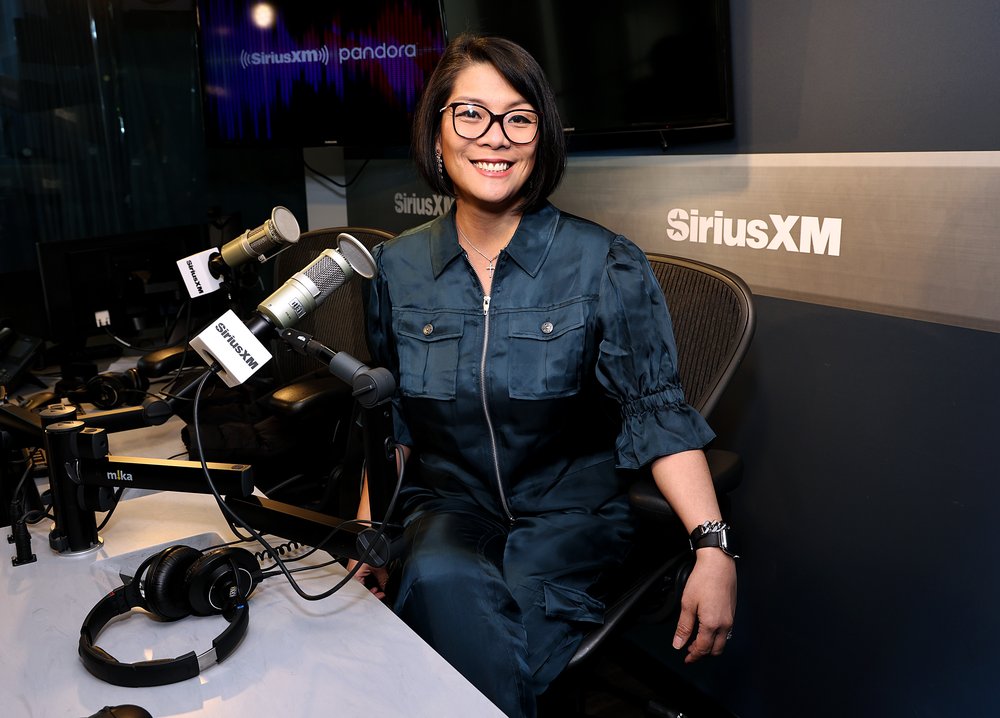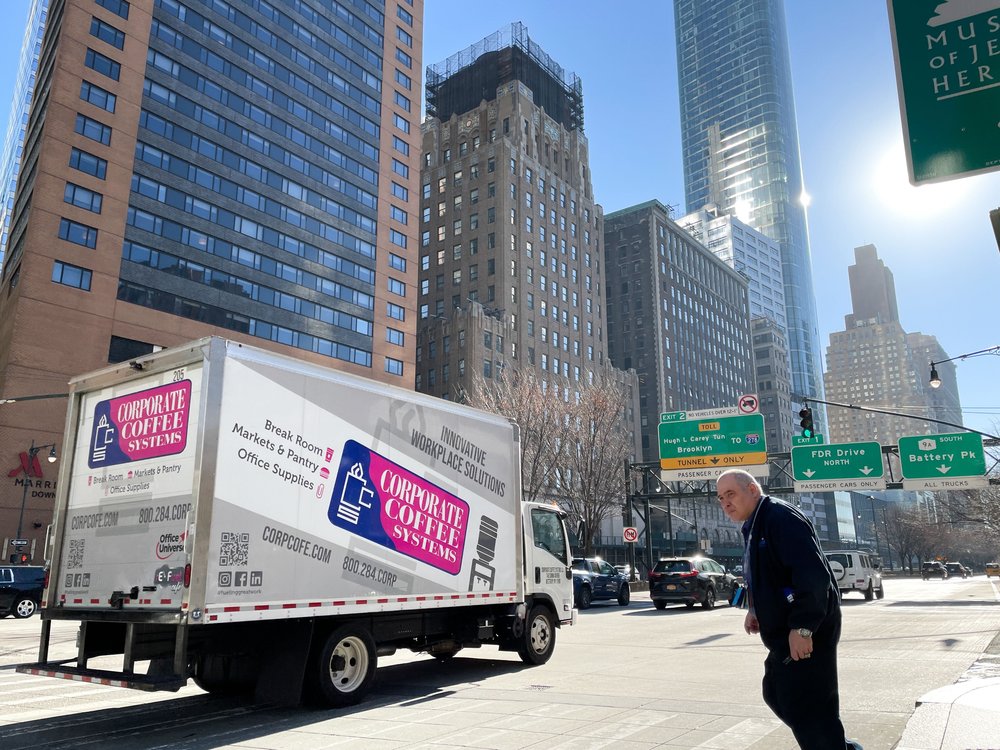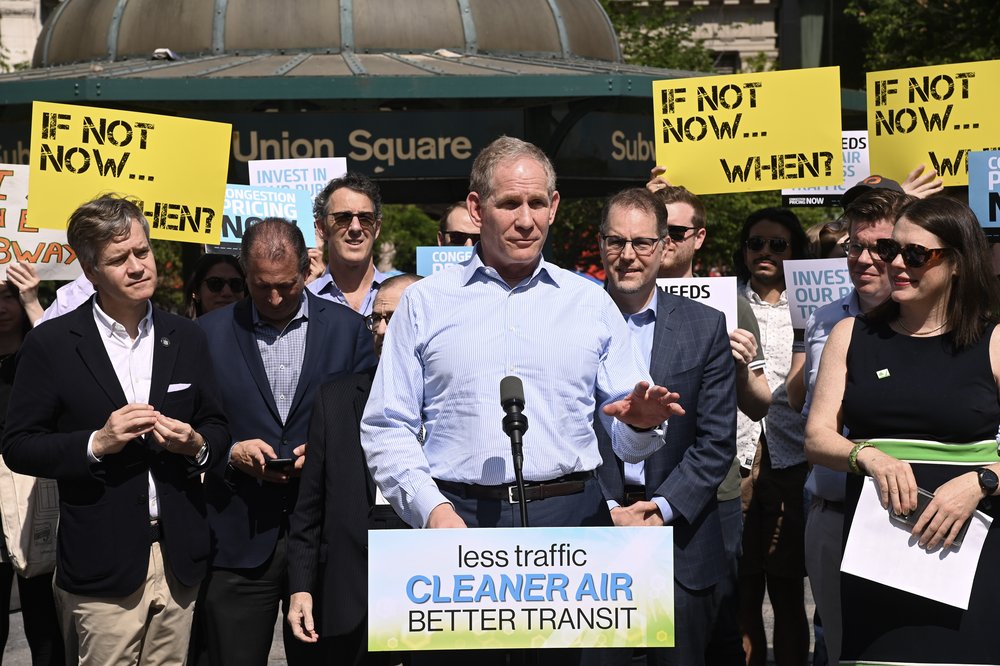Downtown resident sues over congestion pricing, claiming MTA plan will clog West Side Highway
Dec. 25, 2023, 8:01 a.m.
Elizabeth Chan, who exclusively sings Christmas songs, previously won a lawsuit challenging Mariah Carey’s attempted trademark of “Queen of Christmas.”

A Battery Park City holiday songwriter who has successfully sued Mariah Carey now has another high-profile target in her legal crosshairs: the MTA’s congestion pricing program.
Elizabeth Chan alleges in the suit that the MTA didn’t study the effects of congestion pricing on the Lower Manhattan neighborhood, which is built atop landfill between the West Side Highway and the Hudson River. The case appears to be the first legal challenge of congestion pricing brought by people who live within the toll zone
Because any driver who remains on the West Side Highway will be exempt from the tolls, Chan fears the initiative will lead to more pollution and slower ambulance response times in her neighborhood of 17,000 people. She says the tolls are a matter of life and death because her daughter suffers from seizures.
“We rely on the ambulance response time,” Chan said. “And I'm so afraid of the day they won't make it.”
Chan said she wrote the 26-page complaint herself, with some pro bono legal assistance. Another Battery Park City resident, Tamara Hoffman, joined her suit. Chan filed the case in Manhattan federal court the day before Thanksgiving – a marked contrast from New Jersey elected officials, including Gov. Phil Murphy, who have held press conferences announcing lawsuits against the toll program.
Lawsuits filed without the help of an attorney are typically a legal longshot. But this isn’t Chan’s first big legal battle. Last year she won a lawsuit – with the help of a lawyer – against Carey over the pop star’s attempt to trademark the phrase “Queen of Christmas.” Chan also describes herself as the “Queen of Christmas.”
Chan grew up in the neighborhood, where she is now raising two children. Her 3-year-old makes frequent trips to the emergency room. Just this year, she’s said she had to go to the ER or urgent care 72 times.
“We didn't want to do a lawsuit,” she said. “It's just if we want to protect our children and we want to protect our families, the lawsuit was the only option.”
Chan said she and about a dozen volunteers combed through the MTA’s environmental assessment of congestion pricing, as well as the Federal Highway Administration’s approval of the program. Both reviews found the tolls would not harm the environment and that they would benefit the region.
But Chan argues in her suit that the MTA and the federal government did not give proper consideration to Battery Park City, which occupies a unique position in the toll zone. The neighborhood is close to the Brooklyn-Battery Tunnel and west of the West Side Highway. Chan expects a surge in traffic traveling on the West Side Highway to and from the tunnel.
“The West Side Highway will not be tolled, and will, as a result of this exclusion, experience a sharp increase of vehicles seeking to avoid tolls. As anyone who has ever driven in this area is painfully aware — and apparently this number does not include any decision maker in the congestion planning — there is already significant traffic in the area,” she wrote in her suit.
But not all Battery Park City residents agree. Ivy Chang, who has lived in the neighborhood since 1989, was skeptical that congestion pricing will change nearby traffic patterns.
“I don't know whether the increase of the price will decrease the number of cars coming in,” she said. “This is a tourist area and I notice that a lot of cars come through here.”

Oren Barzilay, president of union Local 2507 representing FDNY EMS workers, told Gothamist ambulance response times could go up in Battery Park due to increased traffic. Some EMS workers may quit their jobs rather than pay the tolls to drive to work, he added.
“What New Yorkers should be alarmed at is the increasing possibility of EMS members outright resigning from the FDNY due to this congestion pricing plan,” he wrote in an email. “FDNY EMS is experiencing staffing shortages already and congestion pricing is most likely to add a significant increase in ambulance response times.”
Chan and Hoffman said they tried to raise concerns about their neighborhood during the lengthy public review process.
“There were no good answers and Battery Park City does not exist in analysis,” Chan said. “We exhausted all conversations with elected leaders, we did the federal process, we participated in giving our comments, and we weren't being taken seriously. We weren't heard, we were ignored, and so we were forced to do this lawsuit.”
She says in the suit that kids attending nearby schools like P.S. 89 and P.S. 150 did not get fair consideration from the MTA even though increased traffic would expose them to more pollution.
At least one local school official disagreed. Mark Otto, the head of the Lang School in the nearby Financial District, regularly brings students to playgrounds in Battery Park City. He was not worried about congestion pricing having a negative impact on kids’ health.

“I don't think that we're going to have more traffic on the West Side Highway because, in theory, those people have already been driving on the West Side Highway. [It’s] likely we will have less traffic for people that are not traveling into Manhattan,” Otto said.
Like Gov. Murphy’s lawsuit, as well as another filed by Mark Sokolich, the mayor of Fort Lee, New Jersey, Chan's lawsuit argues the federal government's approval of congestion pricing was “arbitrary and capricious.”
“Every detail of this issue has been studied extensively as evidenced by the 4,000-plus page environmental assessment, and now it’s time to deal with the congestion that’s clogging roads and slowing down buses, emergency vehicles and commerce while also polluting the air we breathe,” MTA spokesperson John McCarthy wrote in a statement.
But all the lawsuits face major legal hurdles, whether they were filed by high-powered attorneys or Chan, who has called herself the world’s only full-time Christmas recording artist.
“You really have to show that an agency really kind of did something beyond the pale and just erred in judgment completely,” said Raya Salter, the executive director of the Energy Justice Law and Policy Center and a member of the New York State Climate Action Council. “This is a high bar for any plaintiff and this is the bar that these plaintiffs will need to meet in the system.”
Both New Jersey’s and Chan’s lawsuits claim the MTA should have done a more lengthy analysis of the tolling program.
But Amy Turner, a law professor at Columbia University’s Sabin Center for Climate Change Law, believes that the MTA and federal government actually went above and beyond what was needed for the environmental review.
“They did sort of the most robust version of an environmental assessment imaginable,” Turner said.
The MTA is in the process of finalizing a $15 base fare that is expected to go into effect in the spring. Settlement talks between the MTA and the state of New Jersey are ongoing.
The MTA filed papers in the New Jersey case last week dismissing the state’s claims it did not have input in the congestion pricing review process as “revisionist history.”
Chan noted that the MTA agreed to spend millions to mitigate additional pollution in the South Bronx due to a projected rise in traffic on the Cross Bronx Expressway when congestion pricing goes into effect.
“Where's our asthma intervention remediation that they're giving to the Bronx?” Chan said.
But the South Bronx is different from Battery Park City. During the review, the MTA designated the Bronx as an “environmental justice community” that is predominantly home to people of color who are low-income and face pre-existing pollution and health issues. The median household income in Battery Park City in 2021, by contrast, was $160,523.
MTA board approves congestion pricing tolls, initiating 60-day review